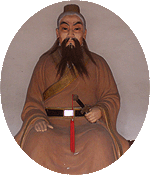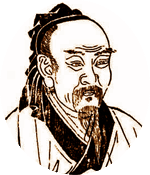An ancient festival, the Dragon Boat Festival or "Duan Wu" dates back to a time several centuries earlier. The origin of the occasion is unknown and has been a subject of great debate among scholars. Several myths are believed to have given rise to this wonderful festival. TheHolidaySpot brings you a well-researched article on the fascinating history of the Dragon Boat Festival. If you want to refer this article to someone, just click here and pass on this page to him/her. Have a wonderful time!
The Dragon Boat Festival or "Duan Wu" or "Duan Yang" (meaning the "Upright Sun" or "Double Fifth" in Chinese) is one of the major Chinese festivals officially celebrated in China on the fifth day of the fifth month of the Chinese lunar calendar. The occasion is typically celebrated during the summer months with boat races and competitions, especially in the southern provinces of China which abound in rivers and lakes. In the West and other countries of eastern Asia, "Duan Wu " this festive occasion is also known as the "Double Fifth Day".
The origin of the "Duan Wu" is shrouded in confusion. The festival is often held to be the oldest Chinese festival, dating back to about 2,000 years ago. However, there is an absence of any concrete proof to establish the exact point of the origin of the occasion. It is also unknown exactly why and from when the annual competition of dragon shaped boats, an indispensable custom associated with this festival, began to be held. The source of "Duan Yang" can be traced only in some of the many popular myths that abound in China.
A number of beautiful myths are believed to be the cause of the Dragon Boat Festival and the Dragon Boat racing. This regatta is an ancient one and is said to have evolved from the practice of revering the River Dragon, to what later became a festival to commemorate the death of the filial daughter Cao Er.
The story of Cao Er is widely known in China. Cao Er is said to be a motherless girl who lived happily with her father in the days of the reign of the Eastern Han Dynasty (25-220 AD). It is believed that her father drowned when she was just 14 years old. Numb with grief, the sad daughter kept on looking for her father's body along the river. When it didn't show up even after 17 days, the forlorn and orphaned Cao jumped into the river and killed herself. This happened on the fifth day of the fifth month of the Chinese calendar. Many boatmen and villagers took out their boats to search for Cao but in vain. Some days later, the body of Cao Er was found embracing the corpse of her father. Cao Er’s profound love for her father, that this act demonstrates, remains to this day a model of filial love. To honor her spirit and commemorate her demise on this date, a statue resembling Cao's likeness is mounted at the head of Dragon Boats in some places.
Many others hold the purpose of the festival to be the worship of Wu Zi Xu (526 BC - 484 BC), an ancient statesman who lived in the Spring and Autumn era (722 BC - 481 BC) of Chinese history. Historical texts mention Wu Zi Xu as the second son of Wu She, the royal tutor in the state of Chu. When the king of Chu ordered the execution of Wu She, misled by false reports of rebellion plots, Wu escaped from his country and took refuge in the state of Wu where he recieved much support from Prince Guang. After the prince ascended the throne of Wu, he began to use Wu Zi Xu in great projects who achieved great accomplishments for the kingdom. But fickle fate soon turned her back on Wu. When King Gunag died, his son Fuchai came to power. The new monarch did not treat Wu as well as his father did and was much influenced by his corrupt minister Bo Pi. Bo Pi hated Wu very much and poisoned the King's mind against him. Believing the baseless slander and rumours, King Fuchai charged Wu Zi Xu with sabotage and forced the innocent minister to commit suicide. Wu obeyed the orders of the monarch, but not before he predicted the impending downfall of the Kingdom of Chu. By royal orders, Wu's body was thrown into the Ching Tang River. This happened on the same Double Fifth Day. But the common people of Chu loved Wu Zi Xu very much and rode their boats on the river in the memory of their beloved minister and prayed for his soul. But as predicted by Wu Zi Xu, shortly after his death the state of Wu was conquered. At the demise of his state, King Fuchai committed suicide too, lamenting that he did not heed the wise counsel of his visionary statesman.

While many stories regarding the origin of the "Double Fifth Day" abound, the myth of Qu Yuan is popularly held to be the actual reason behind the origin of the festival. Qu Yuan was a third century poet and political figure of the State of Chu (situated in present-day Hunan and Hubei provinces). He was a minister during the Warring States Period (475 - 221 BC) of Chinese history. The story about Qu Yuan has been deeply rooted in Chinese culture and is believed by many to be the prime factor for the origin of the festival [Click here to know more about Qu Yuan]. However, scholars and historians have pointed out that a number of popular traditions associated with the festival already existed even before Qu Yuan and they have gone on to suggest many other origins of the festival. Studies have revealed that the nature of celebrations related to the festival is characteristic of the celebration of the harvest of winter wheat and other such crop festivals of ancient Chinese agrarian society. Scholars suggest that similar celebrations had long existed in many other parts of China and with increased interaction between people in different regions of the nation, these festivals eventually got merged and acquired an independent identity.

One more theory holds that the festival originated from the taboo of evil days. Traditionally, the fifth month of the Chinese lunar calendar is held as an inauspicious one since the forces of "ying" and "yang" is considered to be imbalanced during this period. A lot of taboo has come into being as a consequence.
Looking for Something? Search Google :